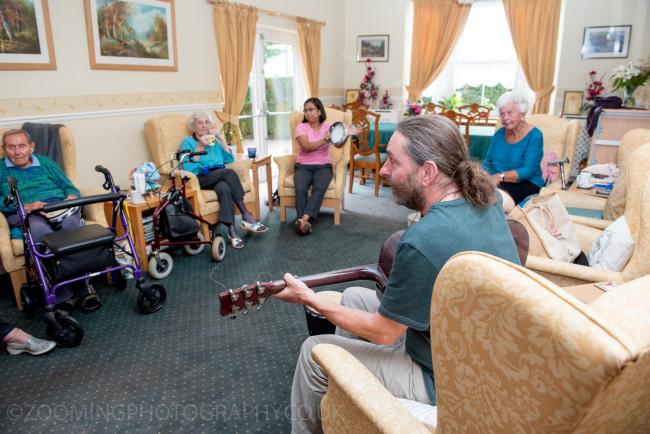
MUSIC has the power to develop open, relaxed and positive relationships in care home settings, making it safer for residents and staff.
Two music from Winchester recently took part in a pilot study, entitled What Good Looks Like, in which music sessions took part in a supported living home.
People who took part in the sessions, both care home residents and the staff, said they were positive experiences and enabled people to talk openly about subjects such as loss and stress.
Meta Killick and Alistair Clarkson, music therapists in the team who led the sessions, are co-founders of Winchester-based music therapy company Living with Harmony. They set up Living with Harmony following the success of the What Good Looks Like project to bring music therapy sessions to vulnerable people across Hampshire.
Meta said: “Our care system is one to be proud of, but we know there are challenges surrounding a culture of fear which can impact on patients, residents and staff. Music has the ability encourage people to have open and honest conversations, on an equal footing, which enhances a feeling of happiness. Through happiness people feel safer. It is clear that music has a profound impact on the people and helps them come together as a community in a positive way.”

The project has shown that music can help vulnerable people and their carers explore issues and emotions to create a more positive environment, which is what Living with Harmony aim to do through their work with care homes in Hampshire. Participants are able to take part in improvised music making or songs that they already know. They are encouraged to use instruments and their voice but also listen to each other. The sessions are tailored to the individual environment and designed to allow participants to make the most out of their inner musicality to boost their wellbeing and improve their quality of life.
As well as music improving care home settings it has also been shown to help people with dementia. A recent report by The International Longevity Centre – UK (ILC-UK), with support from The Utley Foundation, detailed the benefits of music therapy including reducing the symptoms of dementia. However only five per cent of care homes are using it effectively.
“Where words fail, music succeeds,” Alistair added. “Vulnerable people can find it very difficult to articulate what they are feeling or experiencing. Music has a way of helping us express ourselves in a safe way. We are delighted to be able to bring music therapy to vulnerable people across Hampshire. Music Therapy offers an exciting form of expression and we want more people to experience it.”



Comments: Our rules
We want our comments to be a lively and valuable part of our community - a place where readers can debate and engage with the most important local issues. The ability to comment on our stories is a privilege, not a right, however, and that privilege may be withdrawn if it is abused or misused.
Please report any comments that break our rules.
Read the rules here